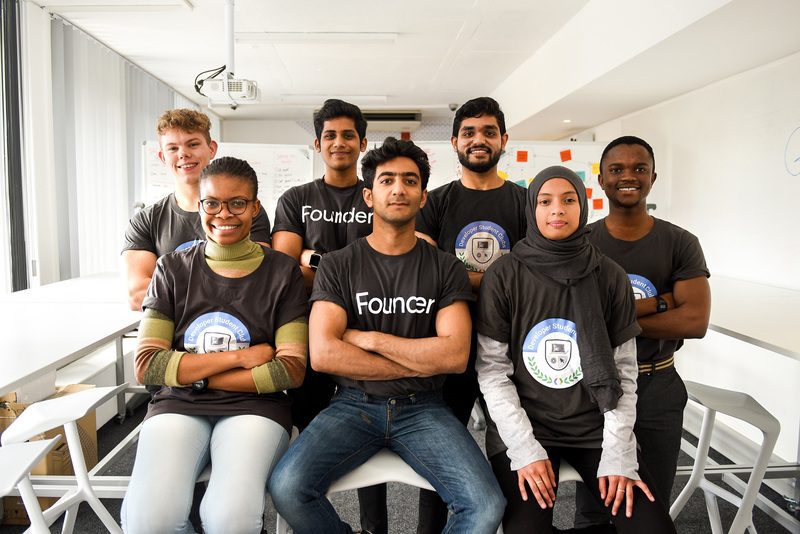Student developers creating societal solutions
29 August 2018 | Story Sarah Middleton. Photo Robyn Walker. Read time 6 min.
The new Developer Student Club (DSC) at the University of Cape Town (UCT), initiated by Google Developers, is aimed at students who want to learn more about web and app development while at the same time finding tech-based solutions to issues in society.
The club was launched on 16 August 2018, in collaboration with the UCT Developer Society.
“The Developer Student Club is a space for students to come and upskill themselves,” said club lead Harjot Singh. “And while they are upskilling themselves they will create apps that will solve the problems around them.
“If there’s a problem in society, [students] can create an app [to solve it]. They can form a group and workshop the development of the app. We encourage problem-solving because we want to make an impact on society,” he added.
A recent tweet by Google Developers reiterates this goal: “Developer Student Club leads want to use tech to solve the worldʼs problems.”
“We encourage problem-solving because we want to make an impact on society.”
Upskilling Africa
Google Developers has started 63 similar clubs in universities across Africa in an effort to increase the skills of budding developers on the continent. The new UCT Developer Student Club was recently invited to a Google Developers summit in Nigeria.
“We attended a summit in Lagos where we were trained on how to set up workshops and events, and other skills like communication, and we met all the [DSC] leads across Africa,” said Singh.
Akhil Boddu, who is one of the UCT clubʼs co-leads, said there is a huge shortage of developers in Africa. In addition, a lot of the start-ups are tech-oriented.
“This means they need developers to build the tech. That’s why initiatives like the Silicon Cape initiative … encourage more developers to come on board. The DSC comes in there and helps developers get upskilled, so they can go out into the industry and actually build stuff,” he explained.
Boddu added that most of their developers will come from the UCT Developer Society.
“Whoever is there is also part of Developer Student Club, so it’s one pool of developers.”
The idea behind the DSC is to facilitate workshops so that developers can improve their skills and learn about the way Google products work, he said.
“A developer has to get used to this kind of environment, where things are changing all the time and technology is getting better and better.”
Singh said that fortnightly workshops, addressing an array of different topics and skills, will be led by experts in the industry.
“Students can approach us and if they really need some help on a specific topic they can tell us and we can have a workshop on that.
“While the workshops are happening, [students] can submit an idea to us. After authorisation they can start working on that project. There is no financing; this is a zero-budget club. We do rely on sponsors though. If there’s any company that wants to sponsor an event they can [do] that. The Google products will not be charged for, but finance will not be provided,” he said.
Learning how to learn
For Asif Hassam, another of the co-leads in the DSC, the club is about “learning how to learn”.
“A developer has to get used to this kind of environment, where things are changing all the time and technology is getting better and better. People are finding better ways to do things. As a developer you’re supposed to have the feeling in you [that you are] able to learn new things,” he said.
Boddu agreed: “The DSC aims to teach developers how to adapt to new tech that comes in constantly, without getting overwhelmed.”
“The DSC aims to teach developers how to adapt to new tech that comes in constantly, without getting overwhelmed.”
Educational technology postgrad Bilqis Deaney is the communication lead for the DSC. Her role is to bridge the gap between developers and the educational side of the club.
“Often we find we are assessing educational apps by developers who don’t have an idea of education itself,” she said.
Lebogang Masekoameng, who said he is “not a developer”, is the marketing lead for the club. According to him, lots of students have complained about the lack of focus on web and app development in the computer science curriculum.
“When you go into the workplace and you want to land your dream job those skills are in high demand. The role that the DSC will play [will be] cutting that gap short, so when you go for internships, or you go into the workplace, that skillset is matched,” he said.
 This work is licensed under a Creative Commons Attribution-NoDerivatives 4.0 International License.
This work is licensed under a Creative Commons Attribution-NoDerivatives 4.0 International License.
Please view the republishing articles page for more information.










